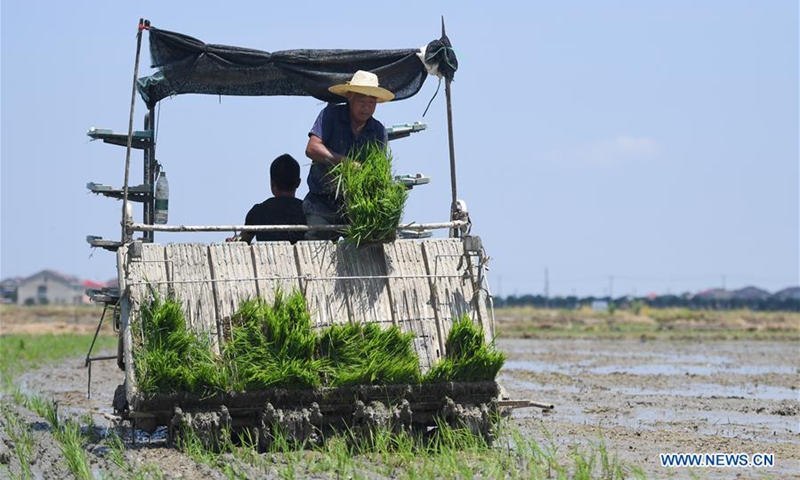Floods will not threaten China's food security: authority
By Fan Anqi Source: Global Times Published: 2020/8/13 16:38:44

Farmers busy in harvesting early-season rice and transplanting late rice in Hunan. Photo: Xinhua
China's food security will not be affected despite floods that have mainly struck southern China and upcoming typhoons and rainfall, China's Ministry of Emergency Management said on Thursday, noting that disaster relief measures will offset the losses caused by water logging.Floods this year have caused damage to 6 million hectares of crops in China, including 1.1 million hectares of complete crop failure, mainly located in the middle and lower reaches of the Yangtze River and the Huaihe River, Zhou Xuewen, deputy head of the ministry, said at Thursday's press conference.
However, Zhou added that the floods will not pose a threat to food security, as many early season crops had been harvested before the floods, while makeup planting after the water logging will also offset losses.
In East China's Jiangxi Province, about one third of the crops have been reaped, while neighboring Anhui Province has harvested even more, as floods came later than they did in Jiangxi," Zhou said, noting that the disaster-stricken areas are currently rushing to plant late crops or cash crops, in an effort to minimize the impact.
Although it may take longer this year for the floods to drain, it will barely slow down the recovery progress in southern China, as water drainage infrastructure is already in place each year when the rain season arrives," Zheng Fengtian, a professor at Renmin University of China's School of Agricultural Economics and Rural Development, told the Global Times on Thursday.
"There is a pattern of more rainfall bringing more harvest," Zhou said, explaining that China is a country of limited water resources, and more rainfall than usual is beneficial to agriculture.
"Floods and water logging will cause crop failures in a region, but makeup planting can more or less offset the losses," Zheng said. "Compared to drought, which is more troublesome for farmers, rich rainfall in a wet year causes floods in southern China but will also enrich water resources in northern regions, boosting the harvest."
"With multiple disaster relief measures being taken, and advanced agricultural technologies applied, China's food security will not be threatened by floods this year," Zhou said.
In 2019, China's total grain output was 663.84 million tons, marking another bumper harvest for the 16th consecutive year, according to data from the National Bureau of Statistics.
The total grain output in the past five years stands at 1.3 billion tons, and the current stock of China's two main grains, rice and wheat, is roughly equivalent to one year's consumption, Jiemian News reported Thursday.
This year's floods have affected 63 million people and caused direct economic losses of 179 billion yuan ($25.8 billion), according to data released by the Ministry of Emergency Management Thursday.
RELATED ARTICLES:
Posted in: SOCIETY